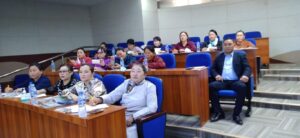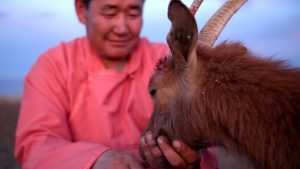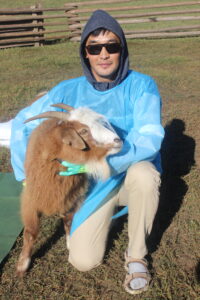SFA WORK PROGRAMMES
Increasingly, brands and retailers in the cashmere sector are looking for ways to enhance their corporate social and environmental responsibility. Full members of the SFA will have the opportunity to invest directly and efficiently in multi-year, field-level sustainability efforts in Mongolia and Inner Mongolia through our individual work programmes.
These programmes are targeted at a smaller scale than our core work and offer an opportunity to support something unique and individual to your brand that contributes to the 2030 Sustainable Development Goals.
The SFA will provide support in selecting a program that best fits your requirements. Your selected programme will become your story to tell, providing you with measurable impact to share with your consumers that will demonstrate your commitment to a sustainable cashmere sector.
Examples of our individual work programmes are listed below
Young Herder Programme
The SFA Young Herder Training programme is focused on the children of nomadic herders – Mongolia’s future generation of cashmere producers. The program is founded on the idea that traditional herding methods are not only best for the land, but at the foundation of Mongolian pastoral culture. Passing on this traditional knowledge to the next generation is vital for preserving Mongolia’s unique pastoral culture.
One way to achieve this goal is to provide education and training opportunities for Mongolia’s young herders. Thus, the SFA have created a course in sustainable rangeland management which draws both on scientific and traditional knowledge. Using specially developed textbooks, modern regenerative farming theories have been incorporated into a foundation of cultural traditions.
The Young Herder Training program was launched in 2018 in Khentii province. In its first year, a total of 450 children from 7 schools graduated from the course. Now in its second phase of development, the programme is being extended across the whole Khentii region. We hope to expand into other regions in the future, supporting young herders across the country in becoming custodians of their natural environment.

Sustainability Awards
Our Sustainability Awards programme is about rewarding herders and communities that are making exceptional contributions to sustainability in the Mongolian cashmere sector. We offer a total of six awards that are available to sponsor on an individual basis by SFA members. This allows your company to select the award/s that best align with your CSR targets and sustainability targets.
• Best Overall Co-operative
• Best Co-operative for Animal Welfare
• Best Co-operative for Land Management
• Best Herder Trainer
• Best Female Herder
• Best Young Herder
With input from our experienced staff in the SFA Mongolia team, these awards have been designed to encourage and acknowledge sustainability efforts and best practices at the producer level. The awards have received considerable attention in Mongolia and have been effective in raising awareness of sustainability issues. They have also signaled to Mongolia’s livestock herders that their efforts to improve the sustainability of cashmere production have the acknowledgement and support of the global cashmere industry.
![]()
![]()
Women Empowerment Programme
Mongolian pastoral women have essential roles as caregivers to their families, but when they forced to lead their households alone, their families are more vulnerable. Recent research has found that female-led families have fewer assets and less access to information and knowledge-exchange than male-led households.
However, when women have the opportunity to lead in their communities, they demonstrate the same leadership qualities as men, and prove to be even better when it comes to trust building among community members. Research also indicates that senior woman or women with higher education levels make a valuable contribution to collective efforts, thus contributing to more successful pastoral communities and sustainable rangelands.
The aim of this project is to empower Mongolian pastoral women by increasing their leadership roles in SFA registered herding cooperatives. The project will be based on the provision of financial incentives. Firstly, incentives will be provided to herding cooperatives that include local senior females as their members and have a least one woman in their decision-making structure. Secondly, incentives will be provided to herding cooperatives that develop social safety nets and offer collective support for vulnerable female-led families.

Animal Welfare Improvement Programme
This project aims to better understand implementation challenges and to ultimately improve compliance levels with the SFA Animal Husbandry Code of Practice. This project will consist of three stages. The first stage of the project will be to conduct an assessment of compliance scores across SFA registered herding cooperatives, where we will identify which elements of the CoP are generally receiving low compliance. In the second stage, we will survey a sample of cooperatives to explore why herders are struggling to achieve compliance for these particular elements. Based on our findings, we will work with cooperative leaders to design a targeted capacity building programme to help herders move toward higher compliance with the Code of Practice. The third stage of the project be to roll out this capacity building program with two herding cooperatives.
If your brand would like to focus your investment in animal welfare, this project would provide an extremely useful contribution to our implementation of the SFA Animal Husbandry Code of Practice. Understanding why herders are struggling to achieve compliance, and then working with herders to figure out how compliance could be improved, provides a promising pathway for improving welfare standards across Mongolia and helping to ensure a long-term supply of responsibly sourced cashmere.

Water Stewardship in the Gobi
Water is a vital resource for pastoral communities, their livestock herds and the native wildlife that share Mongolia’s vast rangeland habitat. In arid regions like the South Gobi, water is often a more limiting factor than grazing forage. However, increased crowding around water sources, reduced rainfall due to climate change and depletion of groundwater reservoirs from mining activities are threatening herder livelihoods and rangeland wildlife. Ensuring sufficient water access for both livestock production and wildlife is one of the key aims of our Water Stewardship programme. The second aim is to foster collective action and good governance of water resources, which in turn will promote secure and equitable access to water for herding communities, along with sustainable and wildlife friendly management of water sources and catchment areas.
This programme will be based on collaborative partnerships with wildlife conservation NGOs that are already working in the Mongolian South Gobi that have good knowledge of local wildlife populations and established relationships with local herding communities. Project activities will include developing training and education materials related to sustainable management of water resources, direct funding for improvement and maintenance of ground wells (including provision of electric pumps to vulnerable households) and financial incentives for herder cooperatives that demonstrate exceptional effort relating to good water stewardship into their rangeland management planning and implementation.
Breeding Improvement Programme
Mongolia is known for producing some of the world’s finest cashmere. However, during the Soviet era the introduction of Russian breeds and a focus on maximising yield resulted in an overall decline in cashmere quality. Fortunately, Mongolia still maintains excellent genetic stock and herders across the country are demonstrating the potential to improve fibre quality through breeding improvement efforts. By investing in these efforts, Mongolia has the opportunity to regain its reputation as a producer of sustainable, high-quality fibre. Furthermore, if price premiums for higher quality cashmere can be achieved, herders would have an incentive to focus on quality instead of quantity, thus raising fewer goats and reducing the level of grazing pressure on rangelands.
The SFA Breeding Improvement programme aims to address some of the key barriers to breeding improvement being faced by Mongolian herders today. These barriers include poor information exchange, poor access to high quality billies, isolation from markets, time and travel costs, lack of knowledge regarding genetics and fibre quality, lack of access to fibre testing equipment at the herder level and the current absence of premium payments for high quality fibre.
Examples of potential programme activities for SFA registered cooperatives include sourcing high quality billies, implementing selective breeding, providing fibre analysis and herd-level recommendations for improving breeding stock, providing training on how to maximise yield while improving quality and establishing monitoring systems to detect improvements in fibre quality over time.

Wildlife Guardian Programme
The SFA Wildlife Guardian programme is concerned with the regeneration and preservation of ecosystems. Mongolia has one of the largest intact rangeland habitats in the world, with a unique assemblage of native wildlife. This program is targeted at three of Mongolia’s key eco regions: desert steppe, forest steppe and grassland steppe. Collectively, these regions are home to a wide range of internationally important animals and plants, many of which are endemic and globally threatened.
To deliver the programme, the SFA will partner with wildlife conservation NGOs, together with SFA registered herding cooperatives, we will adopt a community-based and adaptive management approach to help deliver positive outcomes for local wildlife. Based on our Nutag framework, this approach has proven to be effective for conserving natural habitats and encouraging social ecological sustainability. Our understanding of nomadic herding culture and the coupled human-nature relationships of the Mongolian pastoral system are a great asset when it comes to operationalising at the local level.
Efforts would be focused on key flagship species for each region, such as snow leopards, Pallas cats, saiga, black tailed gazelle and golden eagles. This programme offers the potential to promote your company’s support of wildlife conservation to consumers. For example, you could publicise a percent-based donation of business proceeds to the programme or donate a percent of profit from the sale of limited-edition products with wildlife prints.

